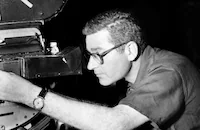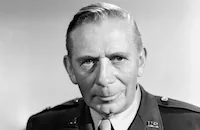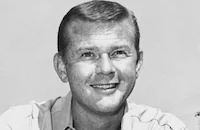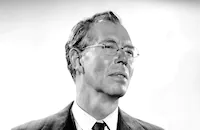I Want You

Brief Synopsis
Cast & Crew
Mark Robson
Dana Andrews
Dorothy Mcguire
Farley Granger
Peggy Dow
Robert Keith
Film Details
Technical Specs

Synopsis
In a small Connecticut town, devoted father George Kress, Sr. asks his boss, contractor Martin Greer, to classify his son as "indispensable" to the company so that George Kress, Jr. will not be drafted for the Korean War. Despite Kress's pleadings, Martin decides he cannot grant the request. That same night, when Martin's carefree younger brother Jack meets his love, Carrie Turner, at the train station upon her return from college. Although Carrie focuses her attentions on her parents, Judge and Mrs. Turner, she whispers to Jack to call her. The next day Martin asks his old friend, retired colonel Harvey Landrum, to work for him, but Harvey has decided his skills are needed in the war effort instead. That evening, when the two meet on the street, George, Jr. questions Martin about his three years of service and Martin invites him to a beer at the local café. Just as bartender Ned Iverson refuses to serve the underage George, Jr., a radio broadcast announces that military personnel are being called up to assist the South Koreans in their war against North Korea. Ned then serves George, Jr. a beer while the older men at the counter soberly watch. Martin returns home to his wife Nancy, who asks him to write a letter stating that Jack is "essential" to the family business so that he can avoid the draft. Later that night, Carrie explains to Jack that, although she has feelings for him, she wants to finish her studies and travel. Jack, interested only in romance, kisses her. When Carrie returns home, the judge voices his disapproval of Jack's courtship, but Carrie asserts that Jack is just a diversion. In his study, Martin begins to write a letter exempting Jack from the draft, but cannot complete it after hearing a radio announcement that the American Air Force has made their first strike on North Korea. Consequently Jack is called before the draft board, among whose members is the judge, who lectures him on America's obligation to protect freedom abroad. Jack is drafted, and on the night of his departure, voices his protest over being forced to serve in the military. Nancy retorts that, although she does not like war, she thinks Jack is acting like an irresponsible, pampered child. Nancy's comments shock the family and Martin tells her they were unnecessary. Later, Carrie secretly visits Jack in the garage and when he blames the judge for his predicament, she defends her father by explaining that he still suffers pain from the shrapnel lodged in his leg during World War II. Jack apologizes to Carrie and then asks her to marry him, but she declines. That night, upset by Jack's departure, his mother Sarah looks at all the weapons and military relics hanging on her living room walls and tells her husband Thomas to remove them, saying there will be "no more professional heroes in the house." Thomas then admits to Sarah that the stories about his own heroic duty during WW II were all lies. Sometime later, Carrie, home from college for her birthday, explains to Nancy that she wants to try to make things work with Jack. Nancy tells her that Jack will soon be home on a ten day furlough before he is shipped overseas. Carrie decides to leave college and wait for Jack to return. When the judge protests her decision, Carrie argues that she wants to give her relationship with Jack a chance. Days later, Jack is returning home by train from basic training and meets Harvey, who has been fighting in the war. Harvey informs him that George, Jr. is missing in action. Consequently, when Harvey meets Martin at the town café, he finds Kress there as well, drunk and brooding over his son's disappearance. Harvey tries to recruit Martin for his outfit but Martin refuses his entreaties. Meanwhile Kress's cries grow louder and he stands up and loudly blames Martin for George, Jr.'s disappearance. Later that night, when Martin tells Nancy that he has changed his mind and feels he should serve, she reminds him that he did serve for four years and that she suffered. Soon after, on the night Martin is being shipped out, Jack and Carrie espouse their love for each other and Thomas admits to Martin that he lied about his heroism during his service. Days later, Carrie and Jack marry before Jack is shipped out and the judge jokingly admits that when he was at their age, he did not listen to his father either.

Director

Mark Robson
Cast

Dana Andrews

Dorothy Mcguire

Farley Granger

Peggy Dow

Robert Keith

Mildred Dunnock

Ray Collins

Martin Milner

Jim Backus
Marjorie Crossland

Walter Baldwin

Walter Sande
Peggy Maley
Jerrilyn Flannery
Erik Nielson
Ann Robin
Carol Savage
James Adamson
Harry Lauter
Robert Johnson
David Mcmahon
Melodi Lowell
Frank Sully
Jimmy Ogg
Jean Andren
Charles Marsh
Don Hayden
Lee Turnbull
Paul Smith
Rolland Morris
Ralph Brooks
Al Murphy
Dee Carroll
Crew
Howard Bristol
Richard Day
Samuel Goldwyn
Samuel Goldwyn
Leigh Harline
Austen Jewell
Fred Lau
Catalina Lawrence
Daniel Mandell
Pat Mcnalley
Gordon Sawyer
Irwin Shaw
Irving Sindler
Harry Stradling
Ivan Volkman
Marie Walter
Mary Wills

Videos
Movie Clip


Film Details
Technical Specs

Award Nominations
Best Sound
Articles
I Want You
Goldwyn never topped that achievement, but he never stopped trying. His subsequent productions were disappointing, both commercially and artistically. By 1950, world events and their influence on his family would lead to Goldwyn's next attempt to recapture the glory of The Best Years of Our Lives. His son, Sam Jr., who had served in World War II and had been living in Europe since then, returned home and joined his father's company as a producer. The younger Goldwyn's first production was supposed to be about an American soldier in the peacetime army in Germany. Then North Korea invaded South Korea. The film was cancelled, and Sam Jr., who had remained in the Army Reserves, was called back to active duty. This disruption of the family's lives and careers gave Goldwyn an idea. As he told the press, he would "tell a story of the effect of America's rearming on the lives of the American family today." Goldwyn asked playwright and Best Years screenwriter Robert Sherwood to develop it, but Sherwood, although enthusiastic about the idea, was too busy to accept. Instead, he suggested Irwin Shaw, who had just published his first novel, The Young Lions. Shaw agreed to write a screenplay, taking the title from a recruiting poster: I Want You (1951). Shaw would later say that he considered the script "whoring," and that "I just gave Sam what he wanted."
Like Best Years, I Want You tells the story of three men: Martin Greer, a World War II veteran with a wife and two children, who runs the family construction business with his father, a veteran of World War I. Younger brother Jack also works, unenthusiastically, for the firm. When Jack is called up, the family expects Martin to ask that his brother be deferred, since he's in an essential occupation. But Martin not only finds himself unable to do so, he's also finding it difficult to refuse an old army buddy who wants Martin to return to active service as well.
To play the brothers, Goldwyn chose one of his Best Years leading men, Dana Andrews, as Martin, and contract player and teen idol Farley Granger as Jack. It would be Andrews' last film under his Goldwyn contract. Goldwyn borrowed Dorothy McGuire from Selznick to play Andrews' wife. Veteran character actor Robert Keith played the senior Greer, and Mildred Dunnock, who had originated the role of Linda Loman in the stage production of Death of a Salesman, was a standout as his wife. (Dunnock repeated the role of Linda in the film version of Death of a Salesman, also in 1951, and she would be nominated for a supporting actress Academy Award for that performance.)
Tired of the producer's constant interference, director William Wyler had left Goldwyn after Best Years, when his contract expired, and had rejected Goldwyn's efforts to woo him back. And cinematographer Gregg Toland had dropped dead of a coronary at the age of 44 in 1948. So it was impossible for Goldwyn to reunite his Best Years team for I Want You. Instead, Mark Robson directed, proving to be more malleable than Wyler. And Harry Stradling, the Oscar®-winning cinematographer of The Picture of Dorian Gray (1945) provided the lustrous black-and-white cinematography. The film's opening aerial shot, with Andrews' voice-over, is intentionally reminiscent of Best Years. And, like Best Years, I Want You ends with a wedding.
Goldwyn promoted I Want You as a worthy successor, but it suffered by comparison. The issues in the Korean conflict were less clear-cut than the threat of fascism had been during World War II, so I Want You's appeal to patriotism was less effective than Best Years' drama of readjustment. I Want You's characters and script were also less compelling. Unlike Best Years' Oscar® triumph, I Want You was nominated for only one Academy Award, for sound recording, and lost to The Great Caruso (1951). In spite of some affecting performances, particularly Dunnock's, the public and the critics were not impressed by I Want You. As Bosley Crowther wrote in the New York Times, "All in all, the running crisis of the 'cold war' has been absorbed in the cotton padding of sentiment. A straight recruiting poster would be more convincing and pack more dramatic appeal." Perhaps if Goldwyn had not persisted in invoking Best Years, I Want You might have been judged on its own merits. Seen today, it is a striking look at the changing American attitudes towards patriotism and global conflict after World War II, and one that still resonates today.
Director: Mark Robson
Producer: Samuel Goldwyn
Screenplay: Irwin Shaw, based on New Yorker stories by Edward Newhouse
Cinematography: Harry Stradling
Editor: Daniel Mandell
Costume Design: Mary Wills
Art Direction: Richard Day
Music: Leigh Harline
Principal Cast: Dana Andrews (Martin Greer), Dorothy McGuire (Nancy Greer), Farley Granger (Jack Greer), Peggy Dow (Carrie Turner), Robert Keith (Thomas Greer), Mildred Dunnock (Sarah Greer), Ray Collins (Judge Turner), Martin Milner (George Kress, Jr.), Jim Backus (Harvey Landrum).
BW-102m.
by Margarita Landazuri

I Want You
Quotes
In about ten years he's going to ask me a question: What were you doing, Daddy, when the world was shaking?- Martin Greer
Trivia
Notes
According to a January 24, 1951 Variety article, Edward Newhouse's The New Yorker short stories, on which the film was based, were written about Newhouse's hometown of Edgerton, New York. Many of these stories were published in Newhouse's book Many Are Called: Forty-Two Short Stories (New York, 1951). One incident in the film in which an underage young man is sold a beer at the local diner on the eve of being sent to basic training is found in the story "The Wacky Afternoon."
Modern sources noted that producer Samuel Goldwyn, Sr. was motivated to produce the film because his son, Samuel Goldwyn, Jr., was drafted and served in the Korean War conflict in 1950. According to an October 1950 Hollywood Reporter article, Samuel Goldwyn, Jr. was to confer with draft director Lewis B. Hershey on script details. A January 24, 1951 Variety article stated that Goldwyn Sr. rushed production on the film in hopes of capitalizing on the actual war, which took place from 1950-1953. Contemporary reviews repeatedly commended the film for its realistic portrait of an American family dealing with the crisis of the war. IWant You was the last Goldwyn film to be distributed by RKO Radio. His next film, Guys and Dolls was distributed by M-G-M. The film received an Academy Award nomination in the Sound Recording category.














